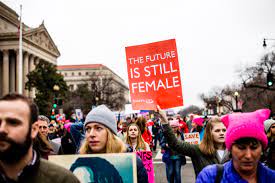Women’s History Month

March is Women’s history month and this year’s theme is “Celebrating Women Who Tell Our Stories.” This theme, designated by the National Women’s History Alliance, will recognize women of the past and present who have been active in all types of media and storytelling. In a way, that includes our very own women in the Spartan Scroll.
We’ve had thousands of years of recorded history, and women make up a huge part of it. Whether it’s little additions or major contributions, it still makes their stories worthwhile. Even in early history, women are still a large part. For example, Agnodice is regarded as one of the first female gynecologists, having bravely practiced medicine in Greece at a time when women faced the death penalty for doing so. She was eventually apprehended and allowed to continue when patients came to her defense.
Eventually, women became integral in the forming of our country. Abigail Adams wrote to her husband in 1776, saying “Remember the ladies and be more generous and favorable to them than your ancestors. Do not put such unlimited power into the hands of the husbands. Remember, all men would be tyrants if they could. If particular care and attention are not paid to the ladies, we are determined to foment a rebellion, and will not hold ourselves bound by any laws in which we have no voice or representation.”
New Zealand became the first country to give women the right to vote in 1893 when Kate Sheppard presented a “monster” petition to Parliament demanding women’s suffrage with nearly 32,000 signatures. Meanwhile, Wyoming became the first state to allow women the right to vote in 1890. It seemed the rest of the world was evolving while the United States was barely catching up. But eventually, the United States caught up with everyone else when the 19th Amendment was ratified in 1920. It declared: “The right of citizens of the United States to vote shall not be denied or abridged by the United States or by any State on account of sex.”
There were many firsts for women in the 20th century. Jeannette Rankin of Montana became the first woman to be elected to the U.S. House of Representatives in 1916 (which was odd because women couldn’t vote). Frances Perkins became the first female cabinet member in 1933, appointed Secretary of Labor by President Franklin D. Roosevelt. Sandra Day O’Connor became the first woman to serve on the Supreme Court in 1981 and was appointed by President Ronald Reagan. Madeleine Albright became the first female Secretary of State in 1997.
It’s clear women are critical to achieving long-term peace. According to studies, when women participate, there is a 35% greater chance of peace agreements lasting 15 years. Nonetheless, women continue to be largely absent from the peace table.
Also in the 1900s, women had two landmark court cases that still affect them to this day. The Equal Pay Act was passed by Congress in 1963, promising equitable wages for the same work, regardless of the race, color, religion, national origin, or sex of the worker. Yet, the gender wage gap still exists for women from all walks of life. Globally, women earn 24 percent less than men. In 1973, the Supreme Court ruled Roe v. Wade making abortion legal. Nearly 50 years later, The Supreme Court overturns Roe v. Wade in 2022, marking outrage across the globe.
While the 21st century has its major downs for women, we had a lot of amazing things that happened. In 2015, 22% of all national parliamentarians were female, increasing from 11.3% in 1995. And In 2016, Hillary Rodham Clinton secured the Democratic presidential nomination, becoming the first U.S. woman to lead the ticket of a major party. And yes, she didn’t win but on Jan. 20, 2021, Kamala Harris became the first female Vice President of the United States. Congress achieved a record number of women just this year, with 128 female House members and 25 female Senators.
Women hold half the world’s potential but society won’t let us use it. While there have been small steps and bounds, we haven’t made those giant leaps for womankind. We must step it up for sustainable progress in an equal world.
Your donation will support the student journalists of Fargo North High School. Your contribution will allow us to resume physical printing of our newspaper for students at Fargo North!

Hi! I'm Grace and this is my second year in journalism! I want to continue in college and in the future! It's been one of the best experiences of my life....



